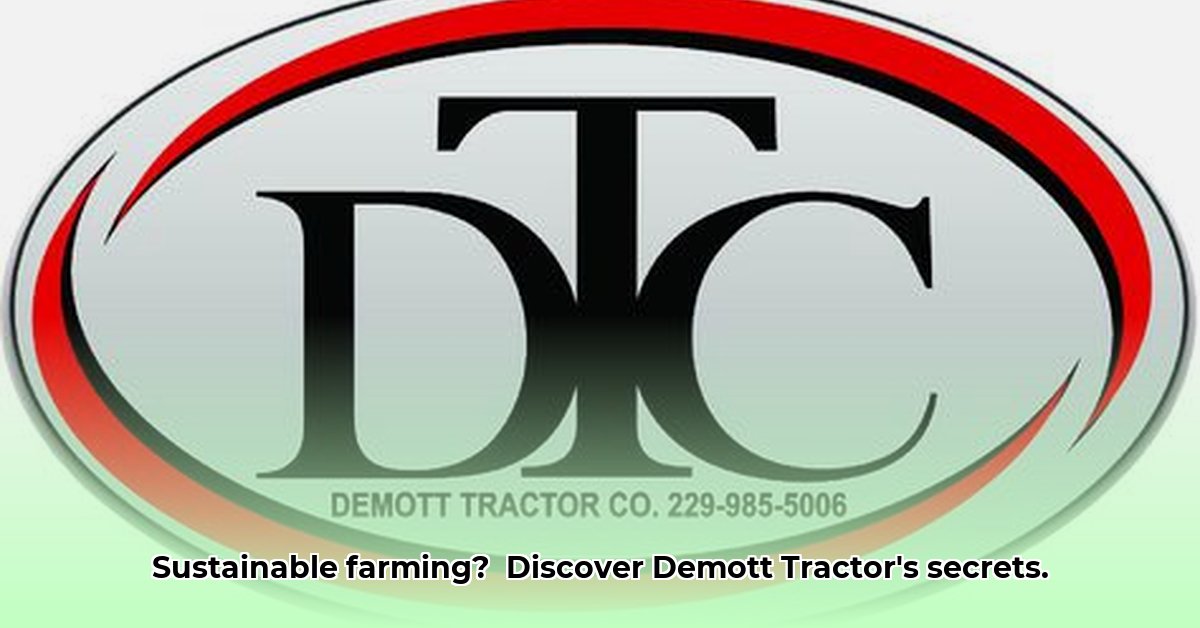
A Case Study in Sustainable Adaptation
Demott Tractor Company, a Moultrie, Georgia institution since 1957, exemplifies how a long-standing family business can not only survive but thrive in the evolving landscape of sustainable agriculture. This case study explores their journey, highlighting key strategies and challenges faced while adapting to the growing demand for eco-friendly farming practices. The company's success offers valuable insights for other small businesses within the agricultural sector.
More Than Just Tractors: Diversification and Growth
Demott Tractor's success isn't solely attributable to selling tractors; it's built on a foundation of personalized service and community engagement. Their deep understanding of local farmers' needs sets them apart from larger, national corporations. This relationship-focused approach, where trust is paramount, has been crucial to their long-term success.
However, Demott hasn't remained static. A strategic partnership with Exmark, a leading manufacturer of lawn and landscaping equipment, broadened their product offerings. This diversification has not only increased sales but also created a more resilient business model capable of weathering economic downturns. This strategic move demonstrates a keen understanding of market trends and the ability to identify synergistic opportunities.
Embracing Sustainable Agriculture: A Strategic Shift
The increasing demand for sustainable farming practices presents both opportunities and challenges. Demott is actively addressing this shift by exploring and incorporating new technologies, signaling a commitment to long-term sustainability and relevance in the market.
Their exploration includes precision farming tools that optimize resource utilization, more efficient irrigation systems, and the potential integration of electric or alternative fuel tractors—a significant and forward-thinking step that will require substantial investment and planning.
Navigating Challenges and Capitalizing on Opportunities
The transition to sustainable agriculture is not without obstacles. Intense competition from larger national dealerships and the ongoing impact of supply chain disruptions present significant hurdles. However, these challenges also present unique opportunities for Demott to differentiate themselves.
By becoming a leader in sustainable farming education and support, offering workshops, equipment demonstrations, and collaborating closely with local agricultural extension services, Demott can foster loyalty and position itself as an industry expert. This proactive approach builds brand loyalty and creates a unique value proposition in a competitive market.
A Roadmap for Success: Strategic Planning and Action
Demott's continued success hinges on strategic planning and execution. Their roadmap includes short-term and long-term goals outlined below:
Short-Term Goals (0-1 year):
Invest in Staff Training: Equip the team with the expertise to effectively sell and support new, sustainable technologies (e.g., attending industry conferences, utilizing expert trainers). This investment ensures a smooth transition and successful adoption of new technologies. Efficacy Metric: 95% staff proficiency in new technology within 6 months.
Upgrade Customer Relationship Management (CRM): Implement a robust CRM system to better track customer interactions, understand individual needs, and personalize the customer experience, crucial for selling more complex equipment (e.g., Salesforce, HubSpot).
Long-Term Goals (3-5 years):
Strategic Partnerships: Forge strong relationships with manufacturers of sustainable agriculture technologies to secure reliable supply chains and potentially preferential pricing. Efficacy Metric: Secure at least three key partnerships within three years.
Develop a Comprehensive Sustainability Plan: Create a detailed plan outlining specific targets and timelines, potentially through collaboration with sustainability consultants. Efficacy Metric: Develop a plan encompassing emissions reduction strategies, waste management plans, and environmentally conscious procurement practices.
Expand Product Offerings: Introduce a broader range of eco-friendly equipment, eventually encompassing a complete solution for sustainable farming practices. Consider innovative financing options to increase accessibility. Efficacy Metric: Expand product offerings by at least 25% within five years.
Collaboration: The Cornerstone of Sustainable Growth
Demott's success is not solely reliant on internal initiatives. Collaboration is crucial. Existing partners like Exmark can provide essential training and marketing support. Local government agencies can offer incentives, grants, or tax breaks to encourage farmer adoption of sustainable technologies. Ultimately, the active participation of farmers is essential to drive demand for these technologies.
Demott's Enduring Legacy: A Sustainable Future for Agriculture
Demott Tractor Company's journey demonstrates the importance of adaptability, customer loyalty, and community engagement in navigating the transition to sustainable agriculture. Their continued embrace of change, strong collaborations, and commitment to service position them for long-term success. Their story serves as a valuable model for other businesses striving to integrate sustainability into their operations.
How to Choose Sustainable Farm Equipment for Small Farms: Key Considerations
Key Takeaways:
- Small farms can dramatically benefit from sustainable equipment, improving efficiency and environmental impact.
- Thorough planning, considering specific needs and budget, is vital before investment.
- A phased approach, starting with essential tools then adding advanced technologies, is highly recommended.
- Demott Tractor Co. demonstrates the importance of adapting to the evolving landscape of sustainable agriculture.
- Government support programs and educational resources can significantly assist small farmers in transitioning to greener practices.